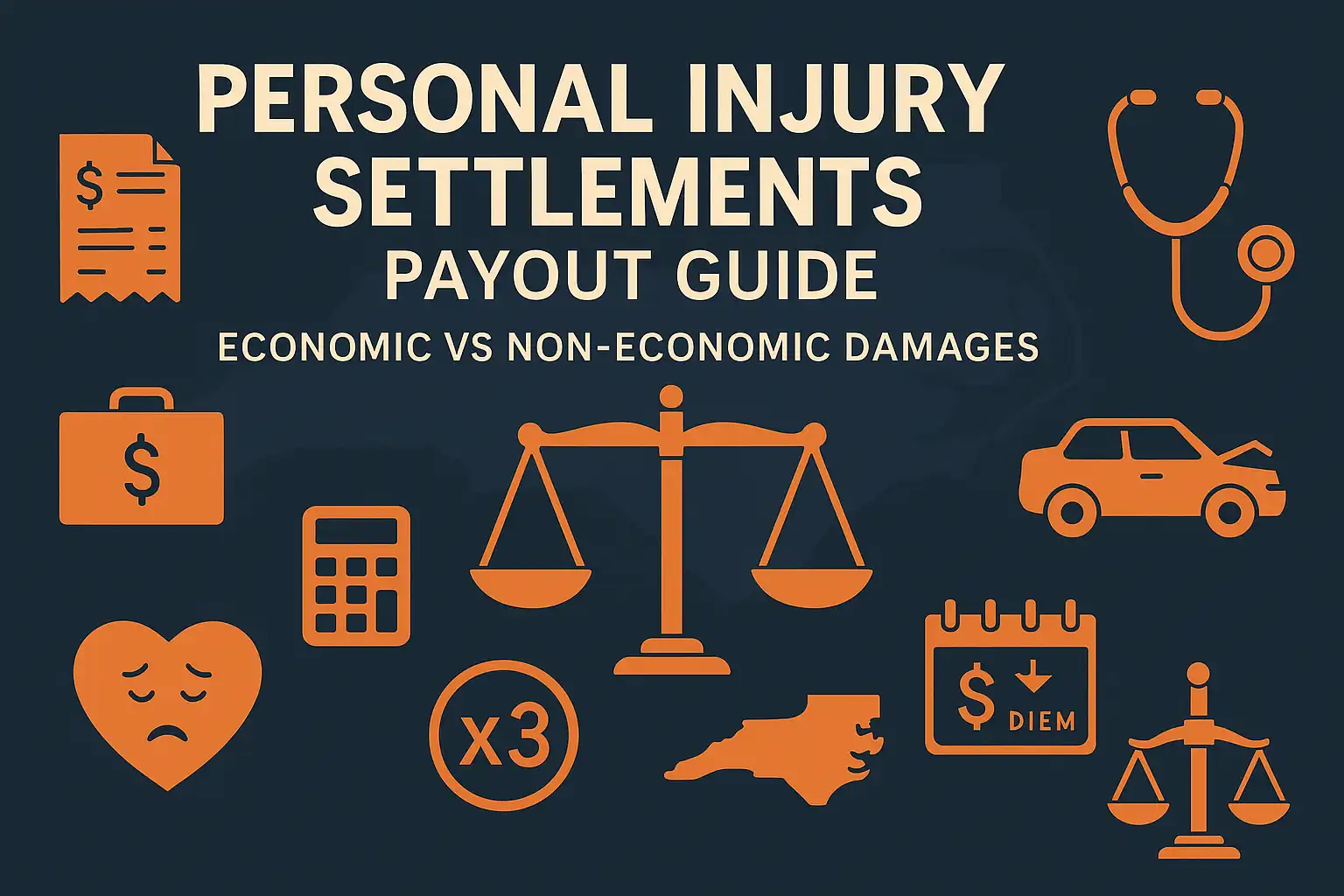Available 24/7
Se Habla Español
Free Case Evaluation
Evaluación gratuita de caso
(919) 438-0065

After an accident, one of the most pressing questions you have is likely, 'How much is my case worth?' The financial recovery, or personal injury compensation, you receive is determined by a thorough calculation of your losses, known legally as 'damages.'
In Raleigh, Cary, and throughout North Carolina, the process of calculating a personal injury payout involves more than simply adding up medical bills. It requires expertise to quantify intangible losses and understand how North Carolina's unique laws—like contributory negligence—affect the final number.
This guide explains the exact components and methods we use to calculate a starting value for your settlement negotiation.
Economic damages are the foundation of your claim—these are the quantifiable, verifiable financial losses proven by bills and receipts.
Non-economic damages compensate you for the intangible, subjective losses that don't come with a bill. These are often the most highly contested part of the settlement, as they require translating emotional and physical hardship into a dollar figure.
Because there is no fixed price for pain, lawyers and insurance companies use calculation methods to arrive at a starting figure for non-economic damages. These methods are estimates, but they provide a foundation for negotiations.
This is the most common approach. The total amount of your economic damages (medical bills, lost wages) is multiplied by a factor—usually between 1.5 and 5. A minor injury might warrant a 1.5 multiplier, while a catastrophic injury resulting in permanent disability or severe scarring could justify a 5x or higher multiplier.
Less common, this method assigns a specific dollar amount for each day you experienced pain and suffering, often starting from the date of the injury until maximum recovery. This 'daily rate' is then multiplied by the number of days affected.
The bodily injury statute of limitations is the most critical factor that can zero out your compensation instantly. In North Carolina, the statute of limitations NC is generally three years from the date of the injury (N.C. Gen. Stat. § 1-52). If you fail to file your lawsuit before this strict deadline, the court will dismiss your case, and you will receive nothing. There are specific circumstances that can alter this timeframe. For example, some exceptions exist, but you must consult with a lawyer to determine your precise deadline.
[Guide to Personal Injury Law in North Carolina]
North Carolina is one of the few states that follows the harsh rule of contributory negligence. If you are found to be even 1% at fault for the accident, you are barred from recovering any compensation, regardless of the other party's negligence. This single law dramatically affects how insurance companies value a settlement, as they will aggressively argue you are partially at fault to avoid paying. This makes strong legal representation non-negotiable.
When an insurance company offers a settlement, it typically finalizes your claim. However, you should be wary of settling small parts of a claim without legal counsel. According to N.C. Gen. Stat. § 1-540.2, settling a property damage claim 'shall not constitute an admission of liability, nor bar party seeking damages for bodily injury or death.' This critical statute prevents the insurance company from arguing that by accepting a check to fix your car, you waived your right to seek compensation for your bodily injuries.
The question, 'What is the personal injury limit in NC?' often refers to damage caps. For the majority of personal injury claims (e.g., car accidents, premises liability), North Carolina has no limit on economic or non-economic damages. However, there is a limit on non-economic damages (pain and suffering) in medical malpractice cases, and a cap on punitive damages in almost all cases.
Calculating a fair settlement is a complex balancing act of bills, formulas, and legal risk. Insurance companies have teams of adjusters whose goal is to minimize your personal injury payout. Our job is to build a detailed case, supported by medical experts and financial projections, to ensure you receive the full personal injury compensation you deserve.
We handle all in the Raleigh, Durham, Apex, and Cary areas. If you've been seriously injured, don't let the insurance company set the value of your case. Contact Paul Robinson Law, P.L.L.C. today for a free, no-obligation consultation.
Call Us At
919-438-0065
105 S Ellington St, Clayton, NC 27520
124 St Marys St Ste 201, Raleigh, NC 27605
800 W Williams St #250 Apex, NC 27502
Clayton Office:
Phone : 919-438-0065
Raleigh Office:
Phone : 919-471-3200
Apex Office:
Phone : (919) 944-4630
105 S Ellington St, Clayton, NC 27520
124 St Marys St Ste 201, Raleigh, NC 27605
800 W Williams St #250 Apex, NC 27502
Copyright @2026 The Law Offices Of Paul Robinson. All Rights Reserved.
This site is for information purposes only. No attorney-client relationship is created by use of this site. No legal advice is intended by its use. An attorney-client relationship is only created speaking to an attorney and signing a representation agreement.
By providing your phone number, you agree to receive text messages from Paul Robinson Law, PLLC. Message and data rates may apply. Message frequency varies.

